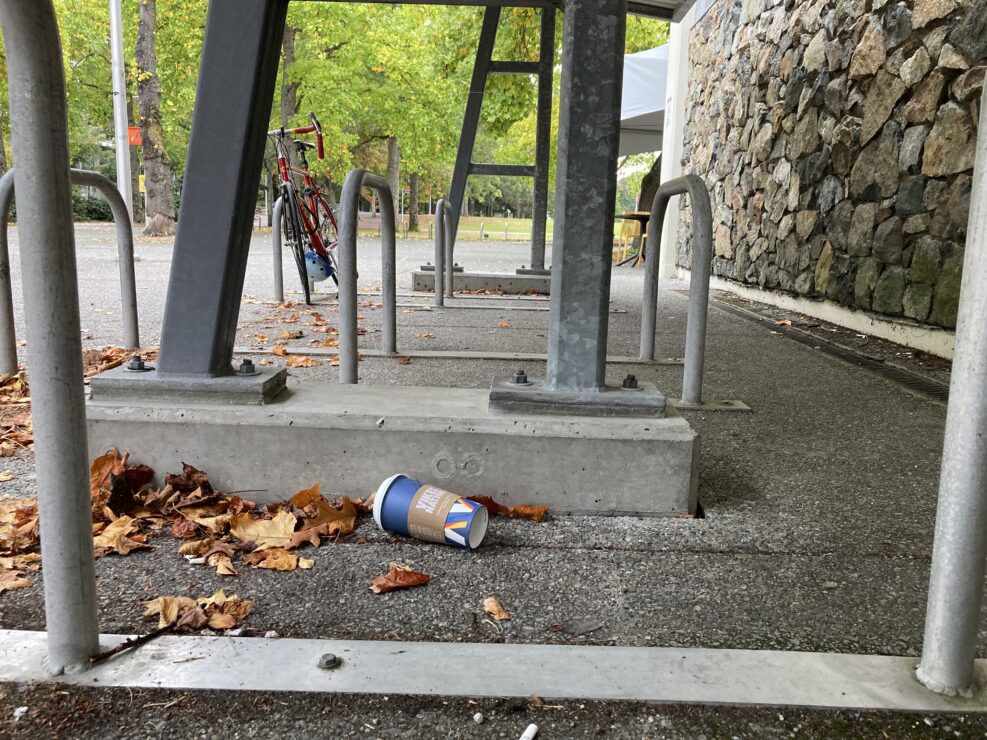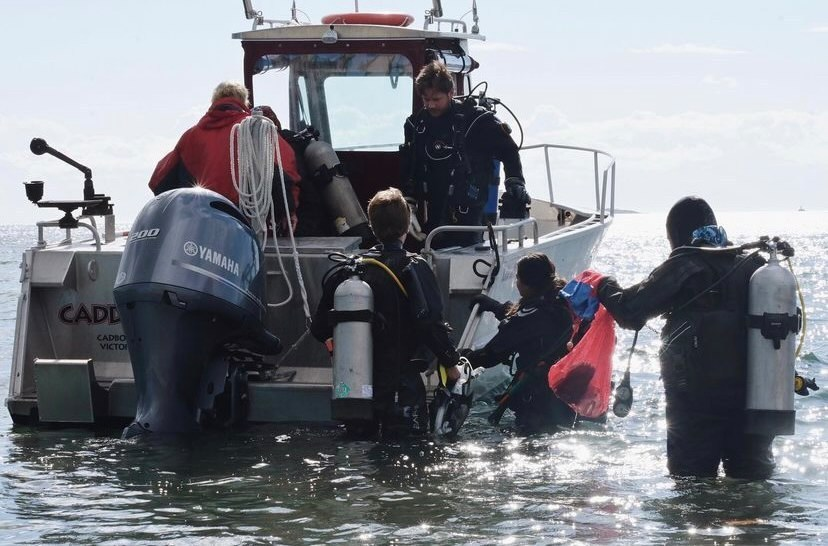UVic says they also are committed to reducing plastic use

If you’ve bought a coffee on campus recently, chances are it came in a paper cup with a plastic lid on top. Surfrider UVic wants to change that.
The club has launched a petition asking UVic to pledge to eliminate single-use plastics on campus. Though it’s challenging to get a clear picture of plastic usage on campus, UVic says they’re already working towards this goal and that their current initiatives are sufficient.
Surfrider petition
Surfrider UVic, a student chapter of the larger organization that focuses on plastic pollution reduction and awareness, launched their petition in mid-September. At the time of writing, it’s received almost 2 300 signatures.
The petition asks UVic to launch a task force to develop steps to eliminate plastic usage, stop using “non-essential, non-compostable” single-use plastics, shift purchasing policies to eliminate single-use plastics, and properly dispose of any single-use plastics still needed on campus.
Surfrider isn’t asking for a total ban — the petition acknowledges that people might need single-use plastics for accessibility reasons, like needing a straw to drink.
“We understand the importance of considering accessibility issues when implementing bans on single-use plastics such as straws, and we are committed to ensuring that no barriers are put in place for people who need these items,” says the petition.
Katie Wilson, president of Surfrider UVic, says the club will continue collecting signatures in the upcoming weeks and hopes to present the petition to President Kevin Hall in late October or mid-November.
Realistically, Wilson says, she’d like to see 5 000 signatures, about 25 per cent of the student body, by mid-November.
One tactic the club is planning on using to garner signatures is to set up a table by the quad and make a visual art piece using all coffee cups disposed of on campus the day before. They hope this will bring attention to the volume of waste produced on campus.
The petition is a collaboration with the Post-Landfill Action Network (PLAN), a U.S. environmental organization that has a pledge that post-secondary leadership can sign to promise a plastic-free campus. Wilson got the idea for the UVic petition after taking a summer course from PLAN a couple years ago.
Karen Johnston, UVic’s associate director of public affairs, says the university has met with Surfrider and shares similar objectives.
“UVic has communicated and met with Surfrider six times in four months (April-August 2021) to hear their concerns about single-use plastics on campus as we share many of the same goals as theirs,” said Johnston.

Plastic use on campus
Plastic use on campus varies across the university. The most visible example, University Food Services, is what Wilson and Surfrider UVic are focused on as a start.
At their food outlets, the university provides single-use coffee cups, cutlery, bottled water and other drinks, and takeout containers. Since April 2018, University Food Services has stopped using plastic straws and soft plastic wrap.
Some of the plastics used by University Food Services, like coffee cups, lids, and sleeves and the plastic shells for baked goods prior to the pandemic, are recyclable. Disposable cutlery on campus is biodegradable.
The university has had to make some exceptions to these practices during the pandemic, due to supply-chain shortages of packaging and health and safety protocols for packaging single-serve items. They also don’t currently allow people to use reusable mugs, but will promote initiatives for that when COVID-19 protocols permit.
In the SUB, single-use plastics are only used where there are no alternatives, and the plastic that is used is biodegradable as per University of Victoria Students’ Society (UVSS) policy. Director of Finance and Operations Dipayan Nag says the UVSS is working on sustainable-use initiatives in the SUB by bringing them under the banner of a single “EcoFoot” working group.
Wilson says making sure plastics can be recycled doesn’t mean they will be.
“Single-use plastics are not often truly recycled,” she said. “Only nine per cent of plastics in Canada are actually recycled, and that’s a fact.”
Johnston emphasizes the effort taken by the university to ensure single-use plastics are properly disposed of. University staff sort the waste left on food trays into recycling and composting streams in the MOD and Mystic Market, and clear signage is present on all waste disposal stations on campus.
According to UVic’s 2020-21 Sustainability Action Plan, University Food Services has a current 84 per cent waste diversion rate that they are planning to enhance. Other goals in UVic’s sustainability plan include introducing a fee for single-use coffee cups and eliminating the sale of drinks in plastic bottles.
For Wilson, focusing on the single-use plastics used by University Food Services was a targetable goal because of the visibility of its items and because many of them have compostable or non-disposable alternatives.
The club isn’t as focused on the packaging used by suppliers, like the packaging that unprepared food items arrive in, for instance. However, UVic says they’re working with their suppliers on this. The university’s 2020 submission to a sustainability self-reporting body says their suppliers use reusable rubber packaging rather than soft plastics and cardboard for many perishable food items.
Packaging is also an exception in the SUB: policy around limiting plastic use extends only to the single-use items bought directly by the UVSS, like disposable coffee cups.
Why plastic?
Single-use plastics were an obvious target for Wilson because, she says, the time they’re used for is so small compared to their environmental cost.
“Single-use plastics are used, generally, in under five minutes,” said Wilson.
Despite its average five-minute cafeteria lifespan, plastics have been found to have a long-term impact on the environment. Reports have shown that plastic pollutes the ocean, hurts and kills animals by trapping or being consumed by them, and emits greenhouse gases when it is produced or burned in landfills.
For Nag, limiting plastic usage is important to the UVSS because it’s something that students care about.
“I believe the saying goes that we don’t inherit the world from our parents but we borrow it from our children,” he said. “What we are doing right now, overall, is unsustainable and that means that we as the students, as youth, have seen that and have taken that up … It’s not just for us but for everyone who comes after us.”







